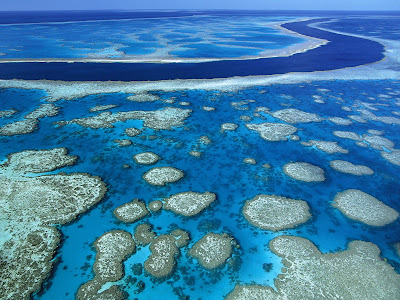The Great Barrier Reef is under pressure from many factors, one of these factors is the poor quality of water running into it from adjacent catchments. Significant amounts of nutrients, sediments and pesticides are entering the Reef, primarily from broad scale agricultural land use. This is impacting on the health of the Reef and affecting its capacity to withstand and recover from climate change related impacts, such as coral bleaching events and increased storm intensity.
About the Reef Plan
In 2003, the Australian and Queensland governments put in place a Reef Water Quality Protection Plan (Reef Plan) to address the issue. The Reef Plan is a framework for the two governments to work together, along with industry, regional natural resource bodies and others to improve the quality of water flowing into the Reef. Read more.....
Do you want to make a difference every day? Want to learn about simple, effective actions you can take to help save coral reefs and the fish, animals, and plants that depend on them? You've come to the right place! Learn how.....
Ten ways to protect Coral Reefs. Learn how.....
THE IMPORTANCE OF ISLANDS...
The very thought of islands conjures up images of romance and tranquility. While it is true that on many of the world's 100,000-plus islands one might find swaying palm trees, lagoons teeming with marine life or waves gently lapping on a sandy beach, the importance of islands goes far beyond their striking beauty. Islands are the earth's great repositories of biological diversity. Thanks to their favorable climates and historic isolation, islands are home to thousands of species that do not exist elsewhere. The coral reefs that surround many islands are often referred to as the "rainforests of the ocean" because of their astonishing marine life. Many islands are home to mangrove forests, the breeding grounds and nurseries for countless species of fish. Even small islands have huge territorial claims to the surrounding oceans. All told, the exclusive economic zones of islands cover one sixth of the world's surface and harbor one half of its marine biodiversity
....AND THE THREATS ISLANDS FACE
But island ecosystems and cultures are threatened as never before. They have a disproportionately high number of endangered species. Seventy two percent of all plant and animal extinctions recorded in U.S. history have occurred in Hawaii. On a global basis, over half of all recent animal extinctions have occurred on islands. Their ecosystems are extremely vulnerable to damage caused by introduced species. Coral reefs are so endangered that 70 percent will cease to function as healthy ecosystems in the next 50 years unless remedial action is taken immediately. Fifty percent of the world's mangrove forests have already been destroyed. Because of their low sea levels, islands are particularly susceptible to the ill effects of global warming. Learn more.....
About the Reef Plan
In 2003, the Australian and Queensland governments put in place a Reef Water Quality Protection Plan (Reef Plan) to address the issue. The Reef Plan is a framework for the two governments to work together, along with industry, regional natural resource bodies and others to improve the quality of water flowing into the Reef. Read more.....
 |
| Great Barrier Reef |
Ten ways to protect Coral Reefs. Learn how.....
THE IMPORTANCE OF ISLANDS...
The very thought of islands conjures up images of romance and tranquility. While it is true that on many of the world's 100,000-plus islands one might find swaying palm trees, lagoons teeming with marine life or waves gently lapping on a sandy beach, the importance of islands goes far beyond their striking beauty. Islands are the earth's great repositories of biological diversity. Thanks to their favorable climates and historic isolation, islands are home to thousands of species that do not exist elsewhere. The coral reefs that surround many islands are often referred to as the "rainforests of the ocean" because of their astonishing marine life. Many islands are home to mangrove forests, the breeding grounds and nurseries for countless species of fish. Even small islands have huge territorial claims to the surrounding oceans. All told, the exclusive economic zones of islands cover one sixth of the world's surface and harbor one half of its marine biodiversity
 |
| Maldives |
But island ecosystems and cultures are threatened as never before. They have a disproportionately high number of endangered species. Seventy two percent of all plant and animal extinctions recorded in U.S. history have occurred in Hawaii. On a global basis, over half of all recent animal extinctions have occurred on islands. Their ecosystems are extremely vulnerable to damage caused by introduced species. Coral reefs are so endangered that 70 percent will cease to function as healthy ecosystems in the next 50 years unless remedial action is taken immediately. Fifty percent of the world's mangrove forests have already been destroyed. Because of their low sea levels, islands are particularly susceptible to the ill effects of global warming. Learn more.....
